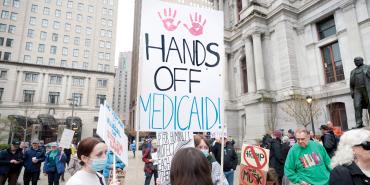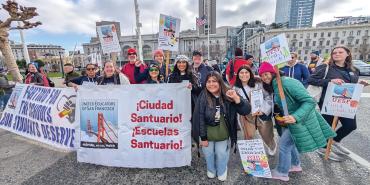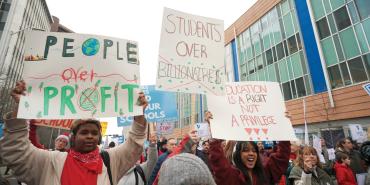At its May 2025 meeting, the AFT Executive Council passed more than two dozen resolutions on a range of issues aimed at creating a better life for students, families, and educators. Here, we highlight several resolutions that address defending democracy, strengthening public education, and fighting for justice, equity, and safety for all.
Defending Democracy
Two resolutions specifically focus on defending democracy and the right to vote. “Mobilizing to Defend Democracy, Expand Opportunity, and Build Power” details the AFT’s commitment to fighting back against democratic, educational, and economic attacks by condemning the Trump administration’s cuts to Medicare and Medicaid and critical federal services, prioritizing the 2026 elections and getting out the vote, and engaging in nonviolent action to make members’ voices heard. It declares that “the AFT will lead with the clarity, courage and commitment that this moment demands—organizing not only to resist authoritarianism, but also to build a stronger, more just future for everyone in this country.”
“In Support of Statehood for Washington, DC,” establishes that defending democracy means ensuring the right to vote for all US citizens and resolves to support the movement for DC statehood, fighting for the autonomy of a location that has not had a vote in the US Congress for 200 years.
Strengthening Public Schools and Higher Education
Nine resolutions highlight the need to strengthen public schools and higher education and make sure these spaces are safe, welcoming, engaging, and relevant. “Defending and Strengthening Public Schools and a Better Life for All” asserts that it is not enough to ward off the attempted dismantling of public education by the Trump administration and right-wing extremists, who are gutting the US Department of Education, funneling funds from public schools through vouchers, and “leading a war on knowledge.” The AFT resolves to “fight for America’s kids and their schools in the courts and in the court of public opinion.… We will lift up the stories of the promise and purpose of public education and the actions our members undertake to honorably serve their students despite the significant challenges they are up against.”
“Protecting Public Education from Right-Wing Extremism” and “Supporting the Freedom to Read in Public Schools and Protecting Our School Librarians from Harassment” further resolve that the AFT will stand in solidarity against forces that seek to destroy public education. The AFT will advocate for teaching accurate and complete US history and the rights of all students to be free of harassment in public schools and to see themselves reflected in school curricula and reading materials.
The AFT’s fight to make public education more welcoming for all students also includes commitments to
- advocate for hiring more Black teachers, for implementing restorative school discipline practices, and for funding more school counseling positions (“Black Lives Matter at School Month”);
- promote rigorous state and national protections for LGBTQIA+ youth and their families, along with educators and others who support them (“Support for the LGBTQIA+ Community”);
- identify policy changes to better support the nation’s growing neurodivergent student population, including the requirement of self-advocacy skills and post-school transition programs (“Neurodiversity Initiative”); and
- advocate for meaningful support of students needing special education services, including ongoing educator training and administrative support and the establishment of an expert-led task force to address issues at the national level (“Continuum of Special Education Services Through Identification of Academically Appropriate Placement and Support”).
Higher education institutions are common targets of authoritarian efforts to weaken democracy by attacking knowledge and silencing debate and dissent. Thus, AFT resolutions specific to higher education decry attempts to repress free speech and deploy state-sanctioned violence against those exercising their democratic rights on higher education campuses. “AFT Stands in Solidarity with Campus Protesters, Demands Their Rights to Protest and Free Speech Be Respected” calls on campus administrators to “cease their campaign of threats, suspensions and expulsions against peaceful protesters and cease using law enforcement agencies to disrupt and attack them. AFT further calls on campus administrations to refuse to assist ICE with unlawful actions on campus or in campus-owned properties. Academic freedom, free speech, the right to assemble and the right to protest are fundamental rights, and they must be respected on campuses and across the country.”
A related resolution, “Opposition to Detainments, Deportations and Visa Revocations in Higher Education,” condemns threats to revoke citizenship, visa, or residency statuses of students who exercise the freedoms of speech, expression, or association, which are foundational to a democratic society. The resolution also establishes the AFT’s commitment to “fight for the humanity and dignity of all, and vigorously defend intellectual freedom and foundational democratic First Amendment freedoms, including the rights to assemble and protest,” and to provide legal resources, training, and guidance to higher education members in this effort.
Fighting for Equity and Safety for Families
Five resolutions detail the AFT’s championing of the health, safety, dignity, and well-being of working families, particularly the most vulnerable. “AFT Supports Cutting Taxes on Working Class and Raising Taxes on Millionaires” calls for comprehensive strategies, including a more effective taxation system and a more just society with “fair wages, benefits and working conditions for working-class people” to address systemic inequities that unfairly advantage the wealthy and burden the working class. In “Fighting Child Poverty,” the AFT resolves to support policies that promote affordable housing and healthcare options, increased access to early childhood and community schools programs, an increased living wage, and economic opportunities to help families break the cycle of poverty. Specific to rural communities, where the rise in authoritarianism is increasing isolation and economic stress, “Rural Connection and Engagement” commits the AFT to fostering greater visibility and connection by amplifying the work of members in rural areas and building support for increased funding for education, healthcare, and public services in those communities.
Because safety is essential to well-being, two resolutions focus on increasing protections for families impacted by inhumane immigration policies and by law enforcement aggression. “Support for New Families” pledges that AFT locals will volunteer to help immigrants displaced by right-wing governors like Texas’s Greg Abbott and offer educators training on the rights of immigrant and unhoused students. The resolution calls for robust bilingual and interpretation services and housing assistance, in addition to preparing more educators and staff to offer appropriate educational programming to newcomer students.
Finally, “In Support of Just, Respectful and Safe Public Safety Practices for All” acknowledges that some communities have a history of experiencing aggression or violence perpetrated by law enforcement, which can be traumatic for students and families. The resolution condemns police violence and calls for (1) a US Department of Justice investigation into the proliferation of local police anti-crime tactical units and (2) efforts to increase awareness in schools about police violence and to “work together to build a more just and equitable society for all.”
For more on these and all recently adopted resolutions, see aft.org/about/resolutions.
[Photos by AFT; courtesy of United Educators of San Francisco; AFT]



